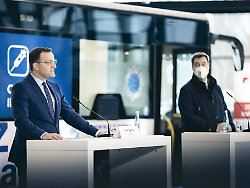Monday, February 08, 2021
Söder stands by the corona strategy
Driving on sight is "annoying", but remains the only option
Corona does not stick to deadlines – accordingly, the federal government cannot set a long-term opening strategy. Spahn and Söder agree on that. Before any easing steps, the numbers have to go down further. There is already a concept for schools that adapts to the infection rate.
Federal Minister of Health Jens Spahn and Bavaria's Prime Minister Markus Söder have dampened hopes for a long-term plan to relax the corona containment measures. "Everyone wants a six-month plan, but there can be no such thing in this dynamic, in this pandemic," said the CDU politician Spahn in the ARD program "Anne Will". It only goes "step by step" – and there are still a few hard and difficult weeks ahead.
Bavaria's Prime Minister Markus Söder made a similar statement in the ARD "Report from Berlin". "Driving on sight is annoying. But driving on sight is the only thing that really helps. Because the challenger we're facing – Corona – does not adhere to any deadlines that we set." Söder said that prospects would be discussed at the federal-state consultations on Wednesday. There will certainly be – "very clearly". "How and how long and to what extent, that still has to be discussed." It is important to send smaller signals – for example in personal services such as hairdressers. "But everything is sensible step by step," said the CSU boss.
Several prime ministers had spoken out on the weekend with easing scenarios. The focus was on demands according to which certain easing steps should be stipulated for certain numbers of infections. For Federal Minister of Economics Peter Altmaier, a rapid reduction in the number of corona infections has "absolute priority" over an easing of the lockdown. Of course, "opening strategies" are also being worked on, he said on "Bild live" with a view to the federal-state consultations on Wednesday. At the moment the "numbers are still too high to be responsible for concrete steps now". Spahn said at "Anne Will": It will still be necessary to adjust the concrete measures, the concrete strategy again and again. "I know everyone has a longing for something that then lasts for six or twelve months. But that doesn't work. The virus is too dynamic. The situation is changing too much," said Spahn.
Spahn said that before it becomes concrete with easing steps one should wait "until we are well below 50 at 100,000". On Sunday morning, the number of new infections reported within seven days per 100,000 inhabitants was 75.6. The previous high of this incidence was reached on December 22nd at 197.6.
Another big topic on Wednesday will probably be schools and the return to classroom teaching. An opening is only "very cautious and careful, in no case possible across the board in all regions," said the president of the teachers' association, Heinz-Peter Meidinger, of the "world". On Monday, Federal Education Minister Anja Karliczek will present a guide to safe school operations. Schools could – if all the rules contained in the guide are strictly observed – open safely even in pandemic times, it says. This is reported by the "Frankfurter Allgemeine Zeitung", which received the recommendations for action in advance.
Specifically, it is about measures such as the division of pupils into groups, the relief of local pupils' traffic by staggered lessons, the wearing of medical masks by pupils and teachers and the ventilation of rooms. In the newspapers of the Funke Mediengruppe, the Minister of Education called for a joint effort with the federal states to support disadvantaged students in the pandemic. "We need a big program so that we can help the children and young people," said Karliczek. "It's not just about imparting knowledge, but also very much about personal development and social interaction." To this end, the federal and state governments would have to create a common framework. "This can be a big event – according to the motto: for strong youth after Corona." She is in talks with the federal states to set up a corresponding program.
Meanwhile, a survey by the opinion research institute Yougov on behalf of the German press agency confirms Merkel's vaccination promise a low level of trust in the population. A large majority of Germans therefore do not believe that the federal government can, as promised, offer everyone who wants to be vaccinated a corona vaccination by September 21. Only about one in four (26 percent) expects the target to be met. 57 percent, however, do not expect it. 17 percent did not provide any information. Chancellor Angela Merkel has announced several times that she wants to make an offer to all adults in Germany who want to be vaccinated by September 21st.
. (tagsToTranslate) Politics (t) Corona measures (t) Corona crisis (t) Markus Söder (t) Jens Spahn
